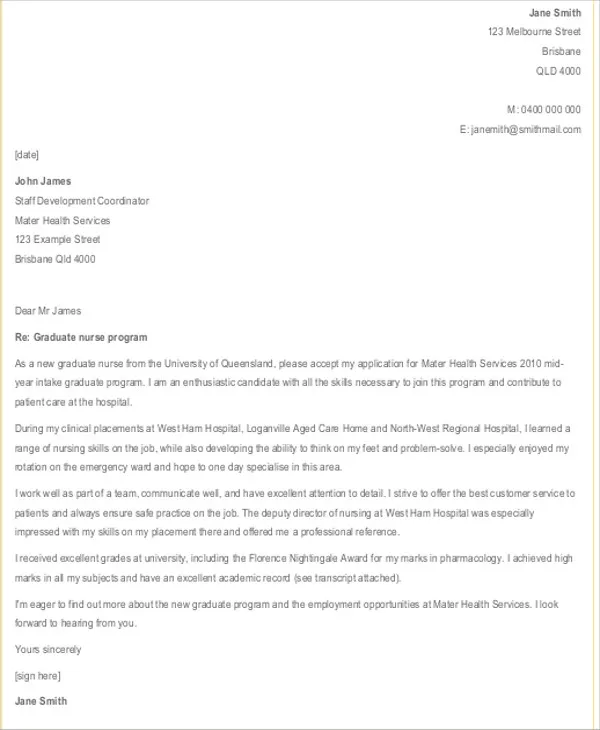Crafting a Nursing Graduate Cover Letter
Landing your dream nursing job as a recent graduate requires more than just a strong resume; a compelling cover letter is crucial. It’s your chance to make a memorable first impression, showcasing your personality, passion, and the unique skills you bring to the table. This guide will equip you with the knowledge and strategies to craft a cover letter that impresses hiring managers and secures you an interview. We’ll delve into every aspect, from understanding the purpose of a cover letter to avoiding common pitfalls, ensuring your application stands out in a competitive field. Start your career with confidence, knowing you’ve presented yourself in the best possible light. Proper cover letter writing is the key.
Understanding the Purpose of Your Cover Letter
Your nursing graduate cover letter serves as a personal introduction, complementing your resume by providing context and detail. It’s where you demonstrate your understanding of the role, the healthcare organization, and how your skills align with their needs. Unlike a resume, which is a summary of your qualifications, a cover letter allows you to connect with the reader on a more personal level, articulating your motivations and aspirations. It’s a chance to explain any gaps in your experience, address specific requirements of the job, and express your enthusiasm for the opportunity. Remember, it’s a marketing tool that sells your value and potential to the hiring manager. Think of it as the voice behind your resume.
Highlighting Your Skills and Experience
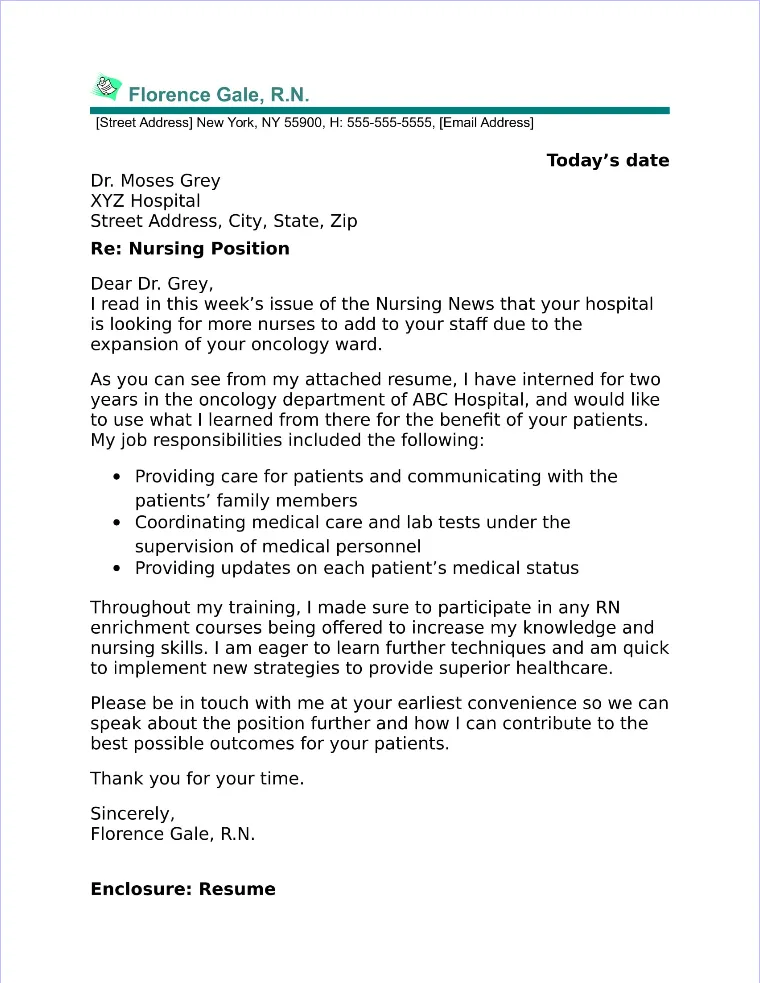
Your cover letter is where you bring your skills and experience to life. Focus on showcasing the skills most relevant to the position, such as patient care, critical thinking, communication, and teamwork. Provide specific examples from your clinical rotations or volunteer experiences to illustrate these skills. For instance, describe a situation where you successfully managed a complex patient case or effectively communicated with a patient’s family during a crisis. Quantify your achievements whenever possible, such as the number of patients you assisted or the positive impact you had on patient outcomes. Tailor these examples to mirror the job description to demonstrate how your experiences translate to the role’s requirements.
Tailoring Your Cover Letter to Each Application
Generic cover letters are easily recognizable and often disregarded. Customize each cover letter to align with the specific requirements and values of each organization. This requires careful attention to the job description, noting the key skills and qualifications they seek. Refer to the specific needs of the hiring organization. Research the healthcare facility and its mission, values, and recent achievements. Demonstrate how your skills and aspirations align with their goals. Use the company name and the hiring manager’s name. Such personalization shows that you’ve invested time and effort, increasing your chances of getting noticed. Use the specific keywords and phrases from the job posting.
Researching the Employer and the Role
Before you start writing, thoroughly research the healthcare organization and the specific role you’re applying for. Understand their mission, values, patient care philosophy, and recent news or achievements. Explore their website, social media profiles, and any available information about their nursing department. This research helps you tailor your cover letter to their needs and demonstrate your genuine interest in the opportunity. Identify the key responsibilities of the position and the skills they prioritize. This information will guide you in highlighting the most relevant aspects of your experience and qualifications. You can learn more about the role and the workplace.
Structuring Your Nursing Cover Letter
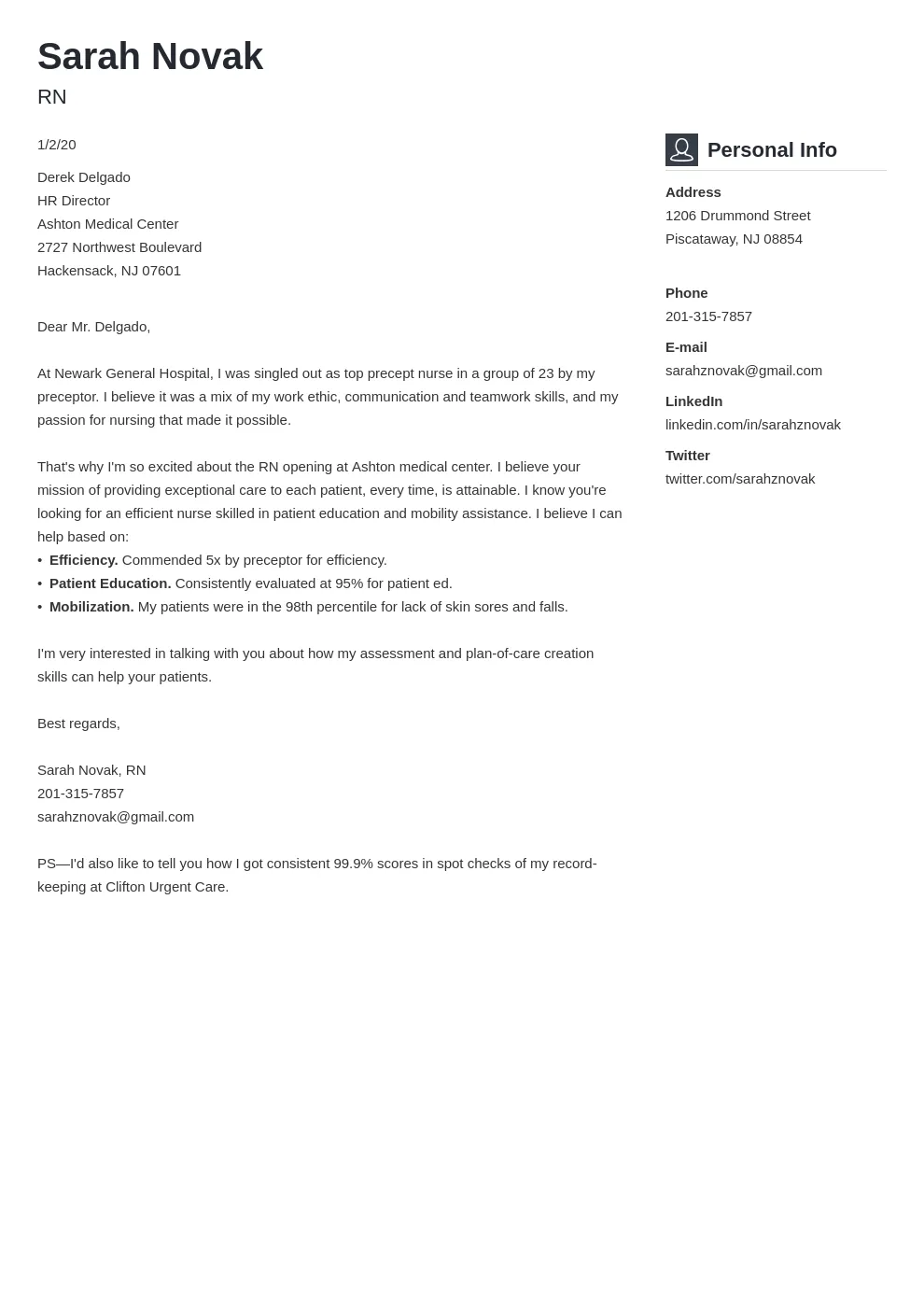
A well-structured cover letter is easy to read and makes a positive impression. Divide your letter into distinct sections that highlight your skills, experience, and enthusiasm. Start with a clear and concise introduction, followed by a body that expands on your qualifications and provides specific examples. Use clear headings and paragraphs to make your letter scannable. Keep it concise and avoid unnecessary jargon. A well-structured cover letter is easier to read and more persuasive. A poor cover letter gives the reader a negative impression and it could lead to your application getting declined.
Contact Information and Salutation
At the top of your cover letter, include your contact information: your name, phone number, email address, and optionally, your LinkedIn profile. Always address the hiring manager by name, if possible. Research the person in charge of hiring, and address the letter directly to them. This level of personalization shows attention to detail and demonstrates that you are serious about the position. If you can’t find the hiring manager’s name, use a professional salutation such as “Dear Hiring Manager” or “Dear Nurse Recruitment Team.” Make sure all information is current and correct. You want the hiring manager to easily reach you.
The Introduction Grab Attention
Your introduction is your first opportunity to capture the reader’s attention and make a strong impression. Clearly state the position you’re applying for and briefly mention where you found the job posting. Then, quickly highlight your key skills or experience. A strong introduction should be brief, enthusiastic, and tailored to the specific role. Consider using a brief anecdote or a statement of your passion for nursing to make a memorable impression. Avoid generic phrases, such as “I am writing to express my interest.” Show them you’ve done your research. You want to instantly signal to the hiring manager that you have what they’re looking for.
Highlighting Your Qualifications
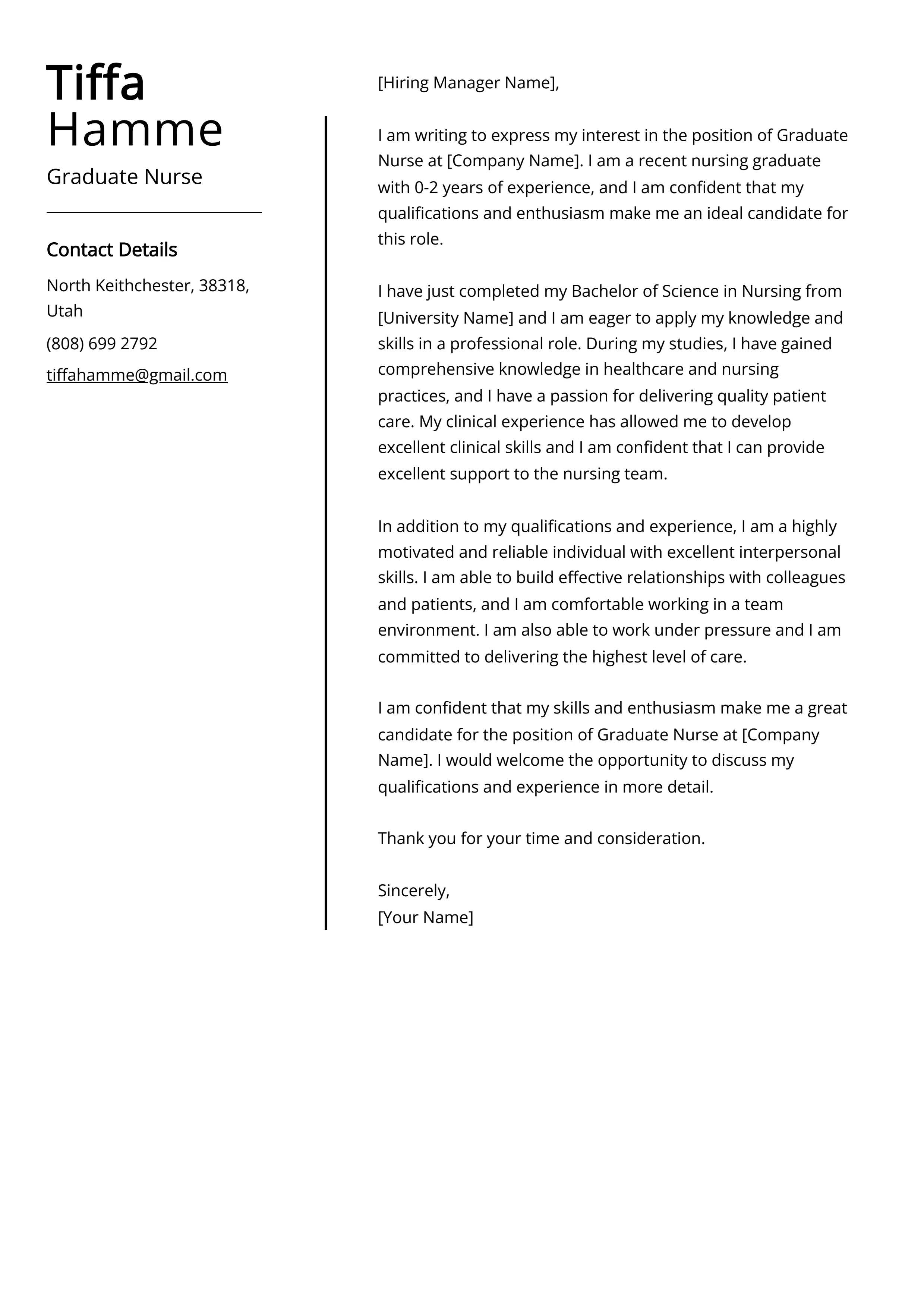
The body of your cover letter is the space to showcase your qualifications. Focus on your most relevant skills and experiences, and use this opportunity to connect with the employer. Explain how your education, clinical rotations, and any relevant experience have prepared you for the role. Use specific examples to illustrate your accomplishments and demonstrate your abilities. The goal is to highlight the skills and abilities that match what the job description is seeking. Match your skills and experience to the job requirements. Consider what they’re looking for, and how your skills meet those requirements.
Showcasing Your Clinical Experience
As a nursing graduate, your clinical experience is paramount. Provide details about your clinical rotations, including the settings, patient populations, and specific tasks you performed. Highlight any achievements or positive outcomes you contributed to. For example, if you improved patient outcomes by implementing a new care plan, or if you received positive feedback from patients or preceptors, share those experiences. Emphasize your ability to work as part of a team. Mention any special skills you have. This section allows you to show your expertise and what you have learned through hands-on experience.
Emphasizing Your Soft Skills
Nursing requires a range of soft skills in addition to clinical expertise. Highlight your communication, teamwork, problem-solving, and empathy skills. Illustrate how you’ve used these skills in your clinical experiences. For example, describe a time when you effectively communicated with a patient to ease their anxiety or when you collaborated with a healthcare team to resolve a patient issue. Mention how you respond to stressful situations, work with different personalities, and show compassion for patients. Show how you can work with people and navigate complex situations.
Expressing Your Passion for Nursing
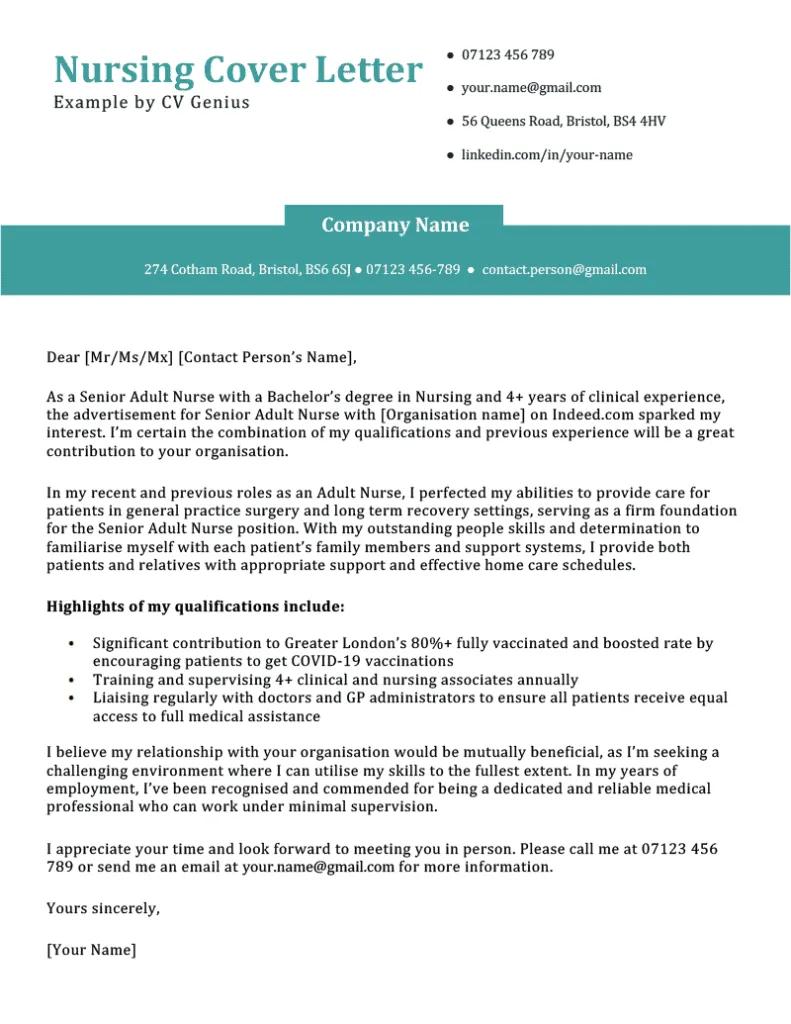
Your cover letter is your chance to showcase your passion for nursing. Explain what motivates you to be a nurse and why you’re drawn to this specific role or organization. Share any personal experiences or values that have shaped your career goals. Your passion demonstrates your commitment to the profession and your desire to make a positive impact on patients’ lives. Describe your core values, and how they align with the company’s. Show how you embrace a career in the medical field, and how much you truly care about your patients.
Demonstrating Your Knowledge of the Role
Demonstrate your understanding of the role and the healthcare environment. Show that you understand the challenges and opportunities within the position. Mention any relevant knowledge you possess, such as experience with specific medical equipment, electronic health records, or nursing protocols. This shows you’re ready to contribute from day one and that you’ve done your research on the role.
The Body Persuade and Engage
The body of your cover letter is where you expand on your qualifications and engage the reader. Use this section to showcase your most relevant skills, provide specific examples, and explain how your experience aligns with the requirements of the job. Structure your body paragraphs logically, focusing on one or two key qualifications or experiences per paragraph. Support your claims with concrete evidence. The goal is to persuade the hiring manager that you are the ideal candidate. This section should provide the hiring manager with the reason to invite you to the interview.
Providing Specific Examples
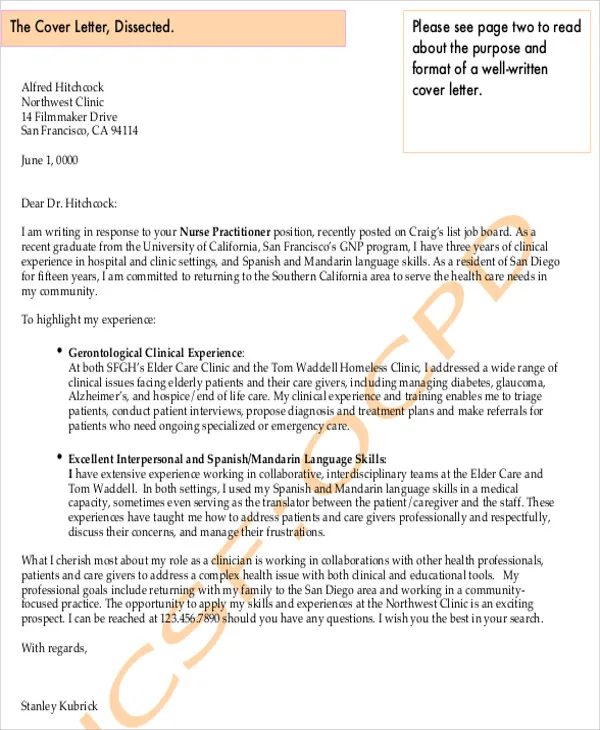
Instead of simply stating your skills, provide specific examples that demonstrate your abilities. For instance, don’t just say you have excellent communication skills; describe a situation where you effectively communicated with a patient to explain a complex medical procedure, and the positive outcome of that communication. Quantify your accomplishments whenever possible. For example, mention the number of patients you cared for, the percentage of patient satisfaction scores you helped improve, or any other measurable results. These examples add credibility and impact to your cover letter. Make it easy to see how you’ve used your skills in real-world situations.
Quantifying Your Achievements
Whenever possible, quantify your achievements to make a stronger case for your qualifications. Use numbers and data to show the impact you’ve had in previous roles or clinical experiences. For instance, mention that you successfully reduced patient fall rates by a certain percentage or improved medication administration accuracy. This data will help the hiring manager visualize your achievements. Quantifiable data makes your achievements more concrete and memorable. This adds weight to your claims. The more metrics you provide, the better.
Using Action Verbs Effectively
Use action verbs to start your sentences and describe your accomplishments. Action verbs add energy and impact to your writing. Examples of strong action verbs include “managed,” “coordinated,” “implemented,” “assessed,” “provided,” “collaborated,” and “achieved.” Use a variety of action verbs to keep your writing engaging and avoid repetition. Action verbs bring your experiences to life and make your cover letter more compelling. You want the reader to visualize your accomplishments.
Avoiding Common Cover Letter Mistakes
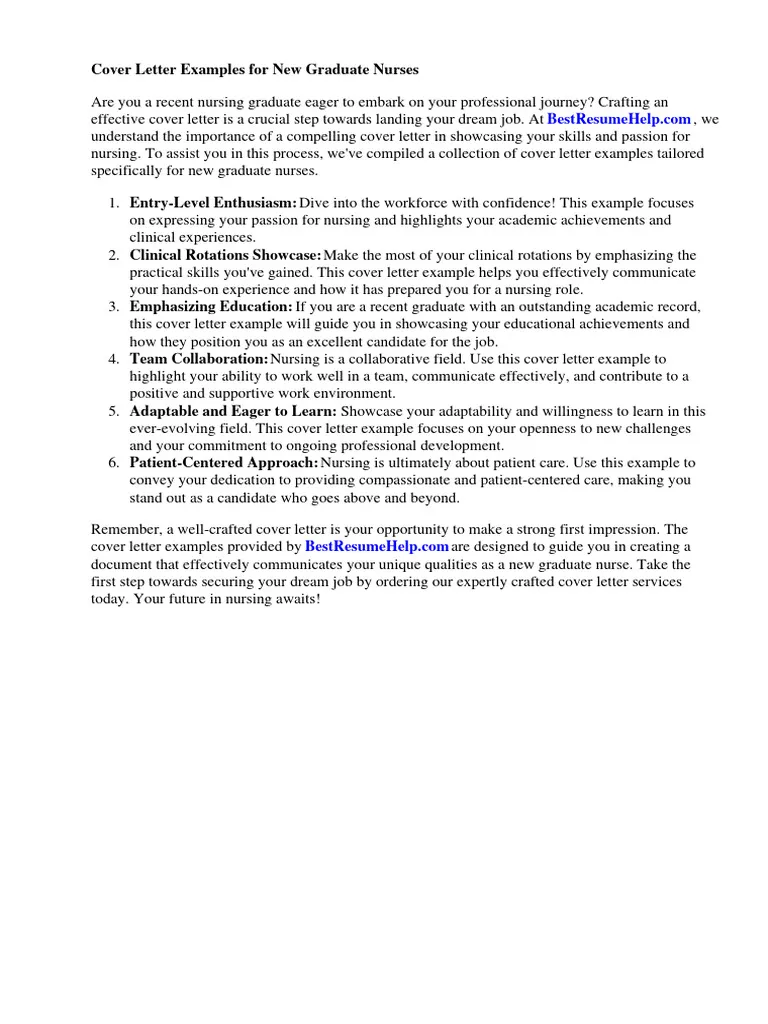
Several common mistakes can undermine your cover letter and reduce your chances of getting an interview. Be aware of these pitfalls and avoid them to create a compelling and professional application. Taking steps to ensure your cover letter is free of errors will increase your chances of getting hired. Errors make the reader question your abilities.
Poor Grammar and Spelling Errors
Grammar and spelling errors are a major turnoff for hiring managers. Proofread your cover letter carefully and use spell-check and grammar-check tools to identify and correct any mistakes. Have someone else review your letter for a fresh perspective. Errors demonstrate carelessness and a lack of attention to detail. Review your work carefully to make sure everything is perfect. A polished cover letter reflects well on you and increases your credibility. Make sure your work is free of mistakes.
Generic Cover Letters
Generic cover letters that could be sent to any employer are unlikely to impress. Tailor your cover letter to each specific job application, highlighting your qualifications and aligning them with the requirements of the role. Research the healthcare organization and demonstrate your understanding of their mission and values. Personalized cover letters demonstrate your genuine interest and commitment to the opportunity. You want to stand out, and the best way to do that is by crafting a unique cover letter that fits the job.
Overusing Jargon
Avoid using excessive jargon or overly technical language that the hiring manager may not understand. Keep your writing clear and concise. Use plain language to communicate your qualifications and experience. Overly complicated language can confuse the reader and make your cover letter less effective. Prioritize clarity and readability. The hiring manager should be able to easily see your value. Clarity is key to effective communication, and that is especially important in a cover letter.
The Conclusion Call to Action
Your conclusion should reiterate your interest in the position and express your gratitude for the opportunity to be considered. Include a call to action by explicitly requesting an interview. Make it easy for the hiring manager to take the next step. A strong conclusion leaves a positive lasting impression and encourages the reader to take action. Clearly state your goal. The conclusion should be brief, and to the point.
Expressing Gratitude
Thank the hiring manager for their time and consideration. Express your appreciation for the opportunity to be considered for the position. A simple statement of gratitude shows professionalism and respect. A polite closing statement is a must for any cover letter, as it shows you appreciate the reader’s time.
Reiterating Your Interest
Reiterate your enthusiasm for the position and the healthcare organization. Briefly restate why you’re interested in the role and how your skills and experience align with their needs. This reinforces your commitment and passion. Make sure the hiring manager understands why you’re interested in the role. Highlight why you are the best candidate for the job.
Requesting an Interview
End your cover letter with a clear call to action by requesting an interview. Make it easy for the hiring manager to take the next step. Express your availability for an interview and provide your contact information again. A call to action ensures that the hiring manager knows how to contact you. A call to action is a great way to show you’re eager to move forward in the process. Make sure the hiring manager can contact you easily.
Formatting and Presentation
The formatting and presentation of your cover letter are just as important as the content. A well-formatted letter is easy to read and makes a positive impression. Pay attention to the layout, font, and spacing to create a clean and professional appearance. Keep your cover letter concise, ideally one page in length. A clean and easy-to-read cover letter is a must. You don’t want a messy presentation, and that is why formatting is so important.
Choosing the Right Font and Size
Select a professional and readable font, such as Times New Roman, Arial, or Calibri. Use a font size between 10 and 12 points. Ensure your font is easy on the eyes, and the font size is appropriate for readability. The last thing you want is for the hiring manager to have trouble reading your application. Your font says a lot about your professionalism.
Keeping Your Cover Letter Concise
Aim for a cover letter that is one page in length. Hiring managers are busy, so brevity is key. Be concise and focus on your most relevant qualifications and experiences. Avoid unnecessary details or rambling sentences. Respect the reader’s time. Stick to the most important points, and make every word count. A concise cover letter is more likely to be read and remembered.
Proofreading Your Cover Letter
Before submitting your cover letter, carefully proofread it for any errors in grammar, spelling, and punctuation. Have someone else review your letter for a fresh perspective. A polished cover letter demonstrates your attention to detail and commitment to quality. Proofreading is an essential step. A cover letter with errors will likely be discarded. Make sure you have a mistake-free cover letter.
Final Thoughts The Path to Success
Writing a compelling nursing graduate cover letter takes time and effort, but it’s a critical step in securing your first nursing job. By understanding the purpose of a cover letter, highlighting your skills and experience, tailoring your letter to each application, and avoiding common mistakes, you can create a document that impresses hiring managers. Remember to showcase your passion for nursing, demonstrate your knowledge of the role, and always proofread your letter carefully. With a well-crafted cover letter and a strong resume, you’ll be well on your way to starting a successful nursing career. Your cover letter is your first impression, so make it count!
